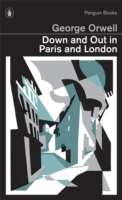Down and Out in Paris and London

Editorial Penguin UK
Fecha de edición enero 2013 · Edición nº 1
Idioma inglés
EAN 9780141393032
224 páginas
Libro
encuadernado en tapa blanda
Resumen del libro
George Orwell's vivid memoir of his time living among the desperately poor and destitute, "Down and Out in Paris and London" is a moving tour of the underworld of society from the author of "1984", published with an introduction by Dervla Murphy in "Penguin Modern Classics". 'You have talked so often of going to the dogs - and well, here are the dogs, and you have reached them.' Written when Orwell was a struggling writer in his twenties, it documents his 'first contact with poverty'. Here, he painstakingly documents a world of unrelenting drudgery and squalor - sleeping in bug-infested hostels and doss houses of last resort, working as a dishwasher in Paris' vile 'Hotel X', surviving on scraps and cigarette butts, living alongside tramps, a star-gazing pavement artist and a starving Russian ex-army captain.
Exposing a shocking, previously-hidden world to his readers, Orwell gave a human face to the statistics of poverty for the first time - and in doing so, found his voice as a writer. Eric Arthur Blair (1903-1950), better known by his pen-name, George Orwell, was born in India, where his father worked for the Civil Service. An author and journalist, Orwell was one of the most prominent and influential figures in twentieth-century literature.
His unique political allegory "Animal Farm" was published in 1945, and it was this novel, together with the dystopia of "Nineteen Eighty-Four" (1949), which brought him world-wide fame. All his novels and non-fiction, including "Burmese Days" (1934), "Down and Out in Paris and London" (1933), "The Road to Wigan Pier" (1937) and "Homage to Catalonia" (1938) are published in "Penguin Modern Classics". If you enjoyed "Down and Out in Paris and London", you might like "Homage to Catalonia", also available in "Penguin Modern Classics".
"Orwell was the great moral force of his age". ("Spectator"). "The white-hot reaction of a sensitive, observant, compassionate young man to poverty".
Biografía del autor
Fue en 1903 cuando Eric Arthur Blair, el escritor británico más conocido por su seudónimo George Orwell, nació en Motihari, India. Estudió en el Eton College de Inglaterra gracias a una beca, y prestó sus servicios en la Policía Imperial. Estuvo destinado en Birmania, de 1922 a 1927, fecha en que regresó a Inglaterra. Enfermo y luchando por abrirse camino como escritor, vivió durante varios años en la pobreza, primero en París y más tarde en Londres. Como resultado de esta experiencia escribió un primer libro 'Sin blanca en París y Londres' (1933), donde relata las sórdidas condiciones de vida de las gentes sin hogar. 'Días en Birmania' (1934), un feroz ataque contra el imperialismo, es también, en gran medida, una obra autobiográfica. Su siguiente novela, 'La hija del Reverendo' (1935), cuenta la historia de una solterona infeliz que encuentra de manera efímera su liberación viviendo entre los campesinos. En 1936 Orwell luchó en el ejército republicano durante la Guerra Civil española (1936-1939). El autor describe su experiencia bélica en 'Homenaje a Catalunya' (1938), uno de los relatos más conmovedores escritos sobre esta guerra y en el que se hace responsable al Partido Comunista Español (PCE) y a la Unión Soviética de la destrucción del anarquismo español que supuso el triunfo de la Falange. 'El camino a Wigan Pier' (1937), escrita en esta misma época, es una crónica desgarradora sobre la vida de los mineros sin trabajo en el norte de Inglaterra. Su condena de la sociedad totalitaria queda brillantemente plasmada en una ingeniosa fábula de carácter alegórico, 'Rebelión en la granja' (1945), basada en la traición de Stalin a la Revolución Rusa, así como en la novela satírica '1984' (1949). Esta última ofrece una descripción aterradora de la vida bajo la vigilancia constante del "Gran Hermano". Cabe citar entre otros escritos, la novela 'Que vuele la aspidistra' (1936) y 'Disparando al elefante y otros ensayos' (1950), ambas consideradas modelos de prosa descriptiva, y 'Así fueron las alegrías' (1953), un recuerdo de sus difíciles años de estudiante. En 1968 se publicaron en cuatro volúmenes sus Ensayos Completos: Periodismo y Cartas. Orwell murió de tuberculosis en enero de 1950, dejando tras de sí un profundo escepticismo por las marañas políticas








